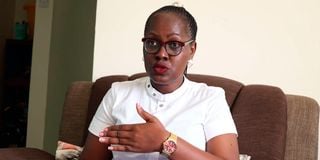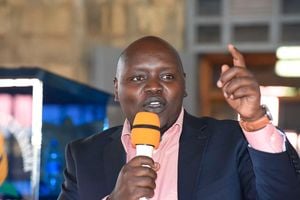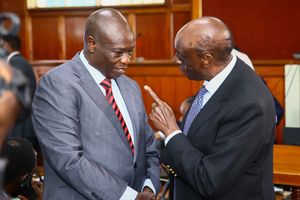How one woman's rock bottom became a lifeline for thousands of cancer patients

Nana Kilemi speaks to Nation.Africa at her home in Kahawa Wendani, Nairobi, on October 10, 2024. Her stage three breast cancer diagnosis in August 2022, became her life's turning point, leading her to declare daily "I am a candidate for long life!"
What you need to know:
- After ignoring a breast lump for three years while recovering from a devastating divorce that left her hawking shoes, Nana Kilemi's stage three breast cancer diagnosis in August 2022 became her life's turning point.
- With just Sh1,000 monthly contributions from friends, she founded an initiative in April 2023, after witnessing fellow patients sleeping on hospital benches and going without care due to poverty.
- Within 18 months, her initiative has helped over 1,000 cancer patients.
- She was declared cancer-free on August 3, 2023.
When you meet Nana Kilemi for the first time, her positive energy uplifts you instantly. Her exuberance, animated gestures, and belly laugh tug at your heart. However, lurking beneath her warm smile that radiates positivity is a scar that tells the story of the darkest moments of her life. Looking at and listening to her, you wouldn't know she is a cancer survivor whose journey has been marred by tribulations.
"Cancer is a tough diagnosis; it brings fear and uncertainty," Nana begins, her voice calm yet imbued with raw emotion. "But sharing my story is my way of encouraging others to fight."
It's a Thursday afternoon, and we're seated in her car at a park in Nairobi CBD. It's a hot day, so we have to run the AC, but Nana shows no signs of discomfort. We had just snatched her from a board meeting in a local restaurant, where directors of her Needy Cancer Health Initiative were assembled to discuss a planned run in Meru to raise funds for a Palliative Care Facility.
"I am so busy at the moment. We just held a fundraising dinner recently and now we have the run on October 19, in Meru... but I am upbeat it will be a success," shares the 42-year-old mother of two and marketer by profession.
Nana's story begins long before her diagnosis. "I actually had that lump around mid-2019, but I was scared, of course, kind of the obvious, and also I had just come from a bad divorce. I wasn't imagining that I could have cancer. I was really devastated with the separation," she says of the collapse of her six-year marriage.
"I trusted him completely, so I didn't insist on having both our names on the title for our marital property," she recalls.
"He left with everything, and I had drained my savings to take care of our family. I was starting from scratch. This guy left me when I least expected it. I lost my property, money, job, and stayed in that cocoon for a long time (five years), crying over that crazy marriage," the woman born and raised in Tigania West, Meru, explains.
The silent battle
After losing her job, she resorted to hawking shoes in Nairobi's Kamukunji just to feed her children. Amidst the agony of her post-separation struggles, the lump in her right breast felt like a stone — a painful reminder of her circumstances. Deep down, she understood the implications, but the fear of accepting the reality paralyzed her.
"I thought the pain in my right shoulder and breast was from carrying the load. But instead of getting better, I was getting worse. I didn't know that cancer is a very fatiguing disease — you are always tired. I survived on painkillers," she recalls.
"In 2020, I was so sick and anaemic, but talking about my breast was too overwhelming." She attributes this delay partly to stress: "After the separation, I think the stress I went through contributed to where I am now. I've read that cancer is 30 per cent stress-related."
The decisive moment came on an ordinary Saturday in August 2022. "I wanted to take a normal shower and decided to check my breast again. I felt like the pain was on fire. And then, I saw it — a huge dent, like a hole. It was terrifying," she recounts, her voice trembling at the memory.
Despite the fear, Nana still hesitated to go to the hospital. All she could think about were her children and the overwhelming question of who would cover the medical bills, as she didn't have a single cent to her name. Not even her elder sister's reassuring promise that they would take care of her and the children could convince her to check into a hospital.
Feeling hopeless after futile attempts, her sister adopted an intriguing strategy — pretending she herself was sick and needed to go to the hospital, only to reveal she was actually coming for Nana. "Going to the doctor was one of the scariest moments of my life," she admits.
The diagnosis was devastating: stage three breast cancer with three lumps. "It's never easy, a cancer diagnosis — it's never easy," Nana recalls. "I knew I could no longer run away from the truth. This was my reality."
Fighting for life
The months that followed were filled with chemotherapy, radiotherapy sessions, and surgery to remove the breast.
"The treatment left me fatigued. I lost my hair, my nails, and even the freedom to live without pain," she recalls.
"But I never let my mind be defeated. There was not a single day I thought I could die. Even when I was in the ICU. Cancer is a game of the mind. If you let it defeat you mentally, it will kill you. The only thing I protected was my mind."
Every morning, she would declare, "I am a candidate for long life!" She credits her recovery to three key factors: "First, I accepted that I had a problem and needed help. I allowed people and doctors to help me. Second, I believed that God was going to heal me completely. And third, I woke up every morning knowing I was in a battle. If I slacked, I could die."
Her family played a crucial role in her journey.
"We come from a close-knit family," Nana says of her nine siblings. "My siblings were also committed to helping me heal, my friends too. My sister even opened her home to my children, providing stability while I focused on healing. I knew that if I died, it would devastate them, so I fought very hard."
Her children, especially her son, were a constant source of motivation. "Every day, my 16-year-old son would tell me, 'Mom, you can't leave us. You have to wake up and fight.'"
To maintain her positive mind-set, Nana immersed herself in uplifting content. "I read a lot. I read books by Joel Osteen and TD Jakes, like Winning the Battle. I also read the Bible and listened to a lot of gospel music. I surrounded myself with positive energy."

Nana during an interview at her home on October 10, 2024. She founded the Needy Cancer Health Initiative in April 2023 while still undergoing treatment.
Nana's experience in the public healthcare system opened her eyes to the struggles of other cancer patients.
"I was treated in a public hospital, and I saw how much people suffered, especially with Social Health Insurance Fund (formerly NHIF). Some people couldn't get approval for chemotherapy or radiotherapy, even after paying their NHIF contributions. People came from far, and they would sleep on benches; they were so sick but couldn't get treatment."
Through her pain, Nana founded the Needy Cancer Health Initiative in April 2023, even before she was declared cancer-free.
"I told my girlfriends, 'We can contribute Sh1,000 each and start paying for health insurance for vulnerable patients.' We started it as a joke, but now we're helping so many people."
In just a year and a half, her initiative has made a significant impact.
"Our database now has more than 1,000 people, and we've paid health insurance for 200 patients, amounting to Sh1.8 million. We've had about 70 per cent success rates, especially with breast cancer cases," says Nana, who uses church and women's groups as disseminators.
The initiative goes beyond just medical support.
"We deal with patients who are poor, hopeless, unseen, unheard, and unknown. In rural areas, there is a lot of stigma around cancer. Many believe cancer is a death sentence, and women patients are often chased away by their families and ostracised by their communities. Some patients don't even have a place to stay, so we end up paying their rent. We start from scratch—buying beds, mattresses, clothes, and food."
“Eighty per cent of cancers are preventable. Education is key,” she emphasises.
Nana's commitment extends to personal involvement in individual cases.
"We have cases where we are fully responsible for the patient," she explains. "For example, we have an orphan named David Mugambi, who has skin cancer. He went 12 years without treatment before I found him. He's been living with me for five months now."
She also cites the case of Jennifer Jelimo, a beautician from Nairobi, who received moral support, treatment for chemotherapy, radiation therapy, and a mastectomy. "She's healed, she's slowly getting back to her life and is one of the champions now."
Nana's focus on rural communities stems from a stark reality: "In Meru, if you're not directly affected by cancer, you're indirectly affected. Approximately 3,000 new cancer cases are diagnosed each year among residents of Meru, making it the county with the highest number of cancer cases in Kenya. The country is recording 42,000 new cases every year, and out of that, 27,000 people die. That's way above average."
To address this crisis, Nana and her team are working on establishing a Palliative Care Centre in Meru.
"We need a place where people can access care, regardless of financial status. A place where they feel safe, supported, and free," she articulates passionately. "The government must ensure proper cancer care facilities in every county. No one should have to travel miles or beg for help to access vital medical care."
Facing challenges
Despite the progress, significant hurdles remain. "Our government is not serious with cancer patients...their policies don't favour cancer patients," she states firmly. "The approval times are too long. When people get sick and don't have cover, there's a period of time you're supposed to wait for the cover to mature. This is cancer... not just any other disease."
Running the initiative comes with its own challenges. "Our biggest challenge is food," Nana explains. "You can't tell a person who is hungry to get well. If organisations, especially food manufacturers, could come on board and say, 'We'll partner with you for a certain period,' it would make a huge difference. Our biggest budget is food."
She also says it's a hurdle to convince rural folk to go for early screening.
"They don't want to go for screening. They say it is better a problem that I don't know even if it will eventually kill me. Women especially are scared that their husbands will leave if they are diagnosed with cancer."
A new beginning
Declared cancer-free on August 3, 2023, Nana's perspective on life has fundamentally changed. "Today, you can be here, and tomorrow, you're gone. Life changes in a second. You can't say, 'Oh, I've got everything together,'... That's why I live for today. I don't stress over things like investments or owning a house. I'm healthy today, and that's what matters. I'm literally living by what the Bible says: One day at a time."
Her journey has also given her a unique perspective on body image and self-esteem, especially for women who have undergone mastectomies. Her approach is refreshingly pragmatic and empowering: "Those things are irrelevant. You are not your breast. Mine was removed, and I thank God for it. I did reconstruction, but I am not my breast. Carry yourself with pride. Which is better—to have the breast removed so you can live, or keep it to please people and die?"
She speaks candidly about her own experience with reconstruction: "I tell people, 'These breasts they gave me, no one can touch them.' I don't even touch them because they are sensitive and painful. They took tissues from my stomach and used them for reconstruction. I also had breast reduction surgery. So, I tell people, 'They are for looking, not for touching.' But none of this changes who I am — it's me who teaches people how to treat me."
Looking forward
Ever optimistic when asked about her fears of the cancer returning, Nana responds with characteristic positivity: "No, I don't think about that. Cancer is a game of the mind. It touched the wrong body, and I'm sure it regrets it."
She is also embracing life fully, including dating. "I'm only 42 years old! I'm dating. There are men who want this vibe!" she laughs, pointing to herself.
A message of hope
Her message to newly diagnosed patients is clear: "Healing starts with acceptance. Many people don't believe it when they get diagnosed. They hide it. But cancer is like pregnancy — it will come out whether you talk about it or not. You must accept and let the doctors, your relatives, and your friends help you."
She emphasises the importance of adhering to medical advice and maintaining faith.
"This is a personal battle — it's not with your husband, children, or relatives. You have to wake up every day and say, 'mimi nitapona (I will heal),' and I'll get out of this."
“Lastly, during the treatment period, you are in a fight, my friend. Ukilegeza kamba hivi, bullet chwa…down.”
As our interview concludes, we ask Nana to describe herself in three words. Her response captures her journey and her mission: "I'm a go-getter. Period. I've never believed in impossibilities!"
Through her Needy Cancer Health Initiative, she's fighting for a future where no one has to face this disease alone or without hope.
"One patient, one community, one day at a time. Who says you'll be here in 10 years? No one knows," she declares.
"Today, I am not just a breast cancer survivor; I am an advocate. I will fight for those who cannot."
Lives touched, hope restored
Martha's journey of hope, healing

Martha Ciaiti Munjuri, is a primary school teacher from Miathene in Tigania West. She was diagnosed with breast cancer in 2022.
For Martha Ciaiti Munjuri, 58, a primary school teacher from Miathene in Tigania West, little prepared her for the day she was diagnosed with stage 3 breast cancer in July 2022.
“My journey started back in 2021 when I noticed my weight decreasing,” she recalls.
At first, she was told it was the flu, then rheumatism. But in 2022, a biopsy in Meru confirmed the worst; cancer.
The news crushed her. Yet, amidst the fear, she found an unexpected lifeline in a woman named Nana Kilemi, a cancer champion she had heard about during treatment.
“I called her. I was hoping for moral support, but I got so much more—psychological, and material,” says the mother of four.
Nana didn’t just provide encouragement—she changed Martha’s outlook.
“She taught me that cancer is curable. At first, I was scared, but she showed me that cancer doesn’t have to kill you unless you let it. You have to be a positive thinker,” Martha says, her voice filled with conviction.
Nana’s influence extended beyond Martha’s personal journey. Through their group ‘Win the Fight’, women across the country came together, united by their cancer battles.
“When one of us is down, we chip in, even if it's Sh100 or Sh500. Nana created this network of support, making sure no one feels alone,” Martha explains.
Today, she has completed two chemo sessions and is hopeful.
“The lump in my breast has disappeared. I trust God that the next scan will show it’s completely gone.”
Nana is our golden girl

Jacinta Gakii, a farmer from Meru County, who is a beneficiary of Nana's initiative describes her as a golden girl.
At 64, Jacinta Gakii, a farmer from Meru County, has faced more challenges than most. Diagnosed with stage 3 breast cancer in 2019, she had a mastectomy in 2020, and her journey was far from easy. But amidst the fear and uncertainty, she found an unexpected source of strength in a fellow cancer survivor, Nana Kilemi.
“I met Nana when she was diagnosed with cancer,” Jacinta recalls. “As a survivor myself, I encouraged her, telling her that cancer is not a death sentence. She accepted this, and she came out a victor.” Nana’s personal battle with cancer inspired her to take action—not just for herself, but for others. "She started visiting the needy, giving food, and paying NHIF for those who couldn’t afford it. She’s touched so many lives, especially in Igembe."
Nana’s impact goes beyond material support. “She brought us an Irish woman who donated prosthetic breasts…and now we walk like women again. We are not ashamed,” Jacinta shares.
“If Nana had more sponsors, she could help so many more in rural areas.”
Nana’s compassion extends to those in the final stages of cancer.
“She’s visited terminally ill patients, cleaning them, buying bed sheets — doing things that most would shy away from. She teaches us that cancer is not witchcraft, but a disease like any other,” Jacinta says.
Jacinta is back on her farm, stronger and more hopeful. "Nana is a golden girl," she smiles. "We need more champions like her."
Jacinta dreams of a future where cancer care is accessible, and communities are better informed.
"The government needs to treat cancer like HIV, with free treatment and early screening."
She also emphasises the importance of men coming forward as champions.
"I wish men could come up and speak to other men about prostate cancer," she says.






